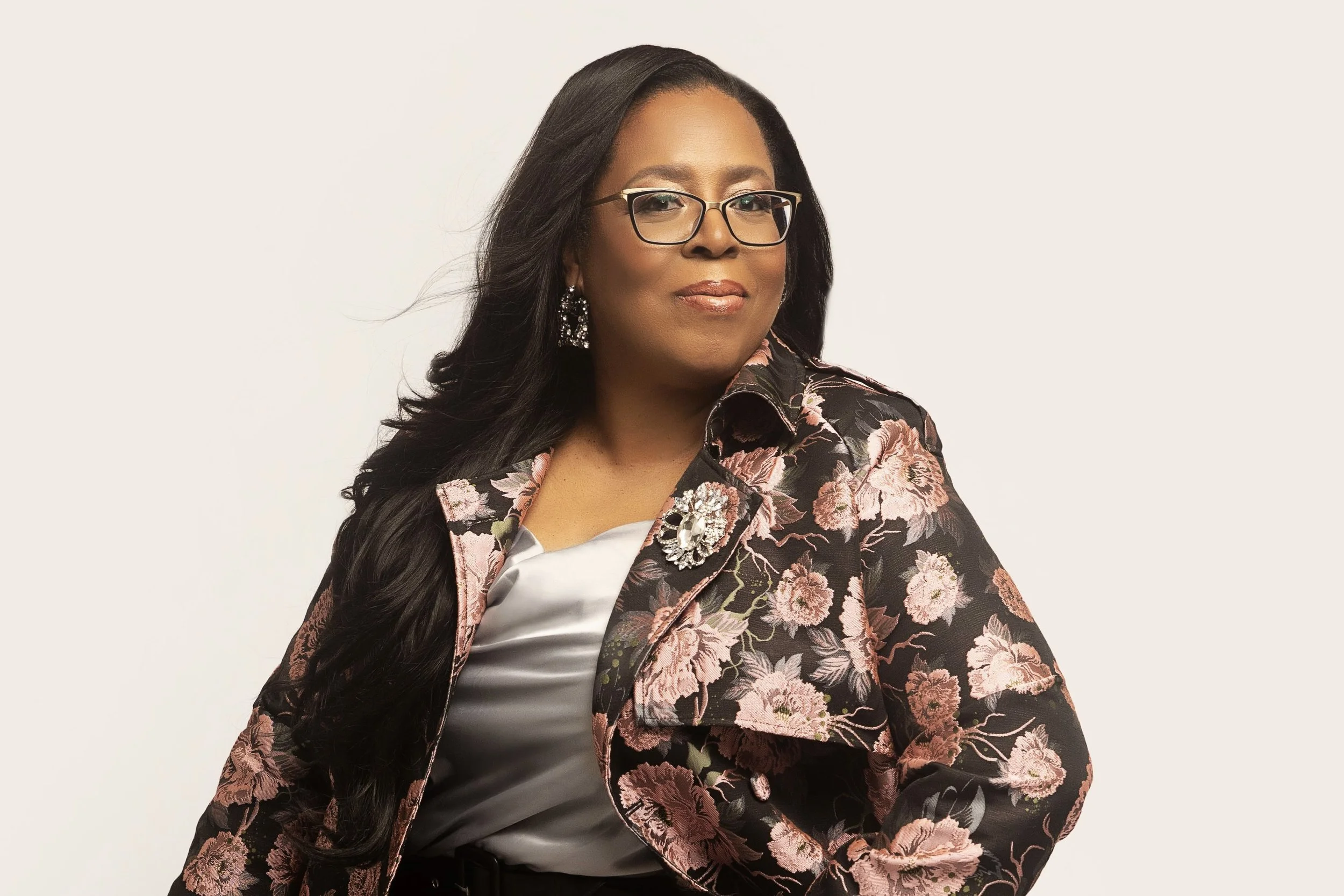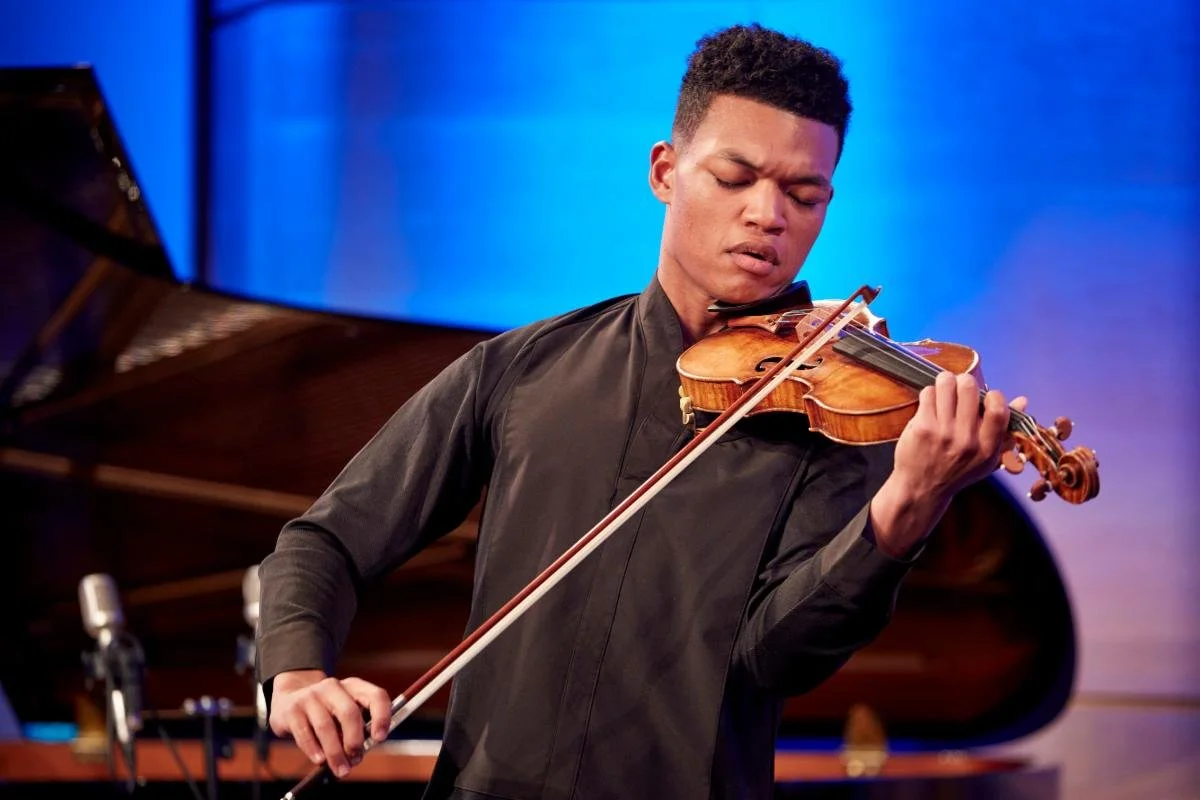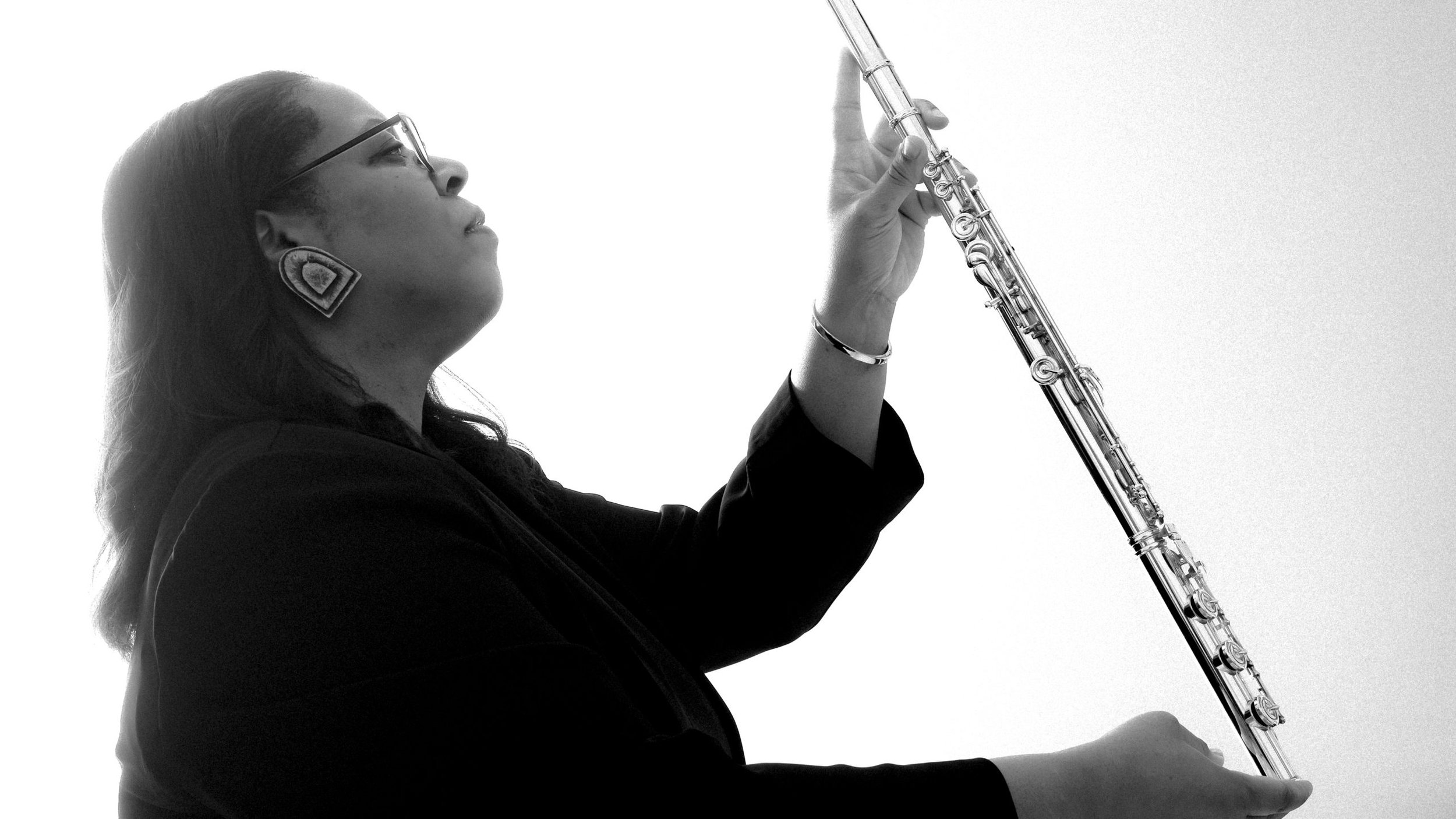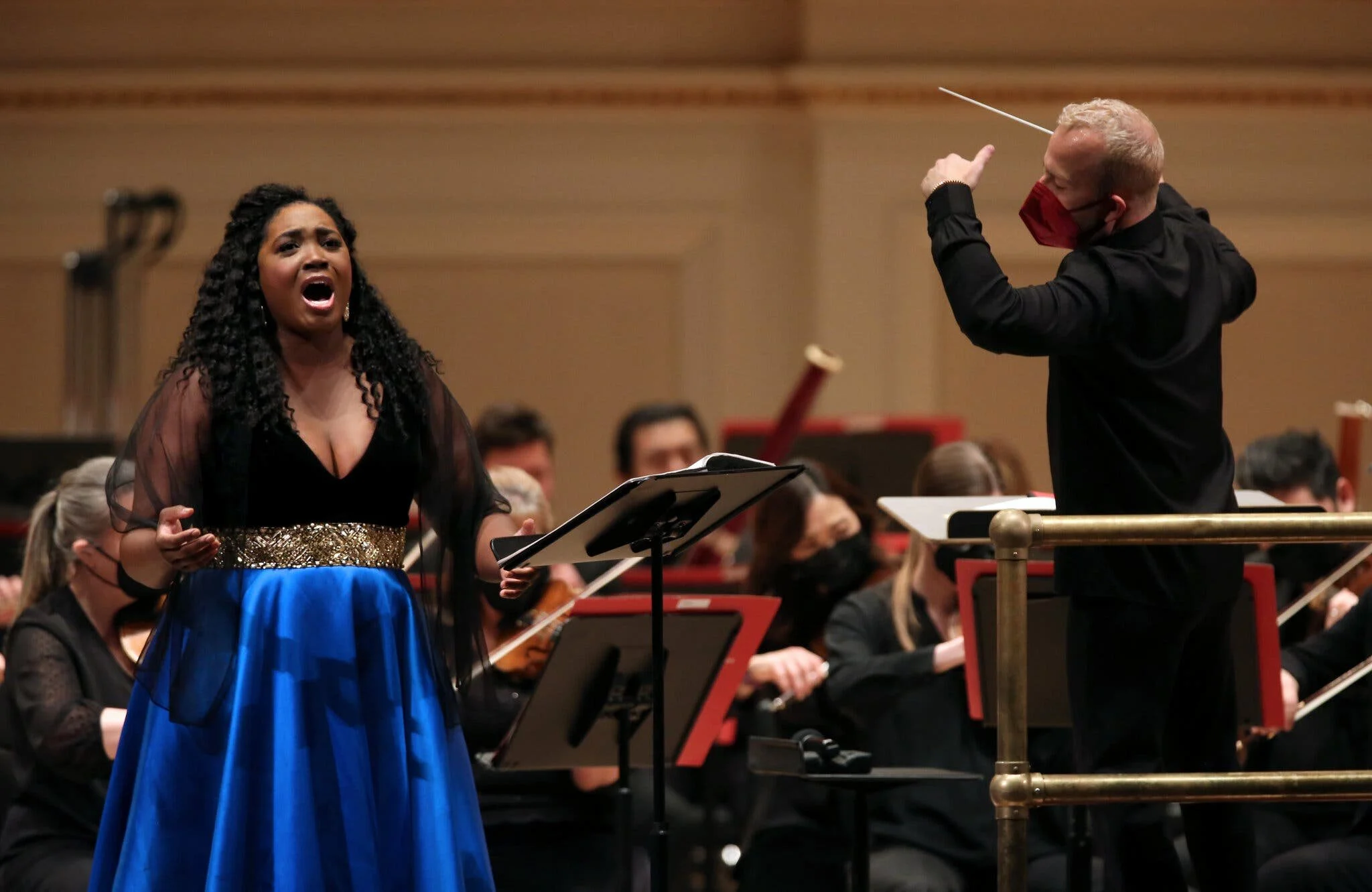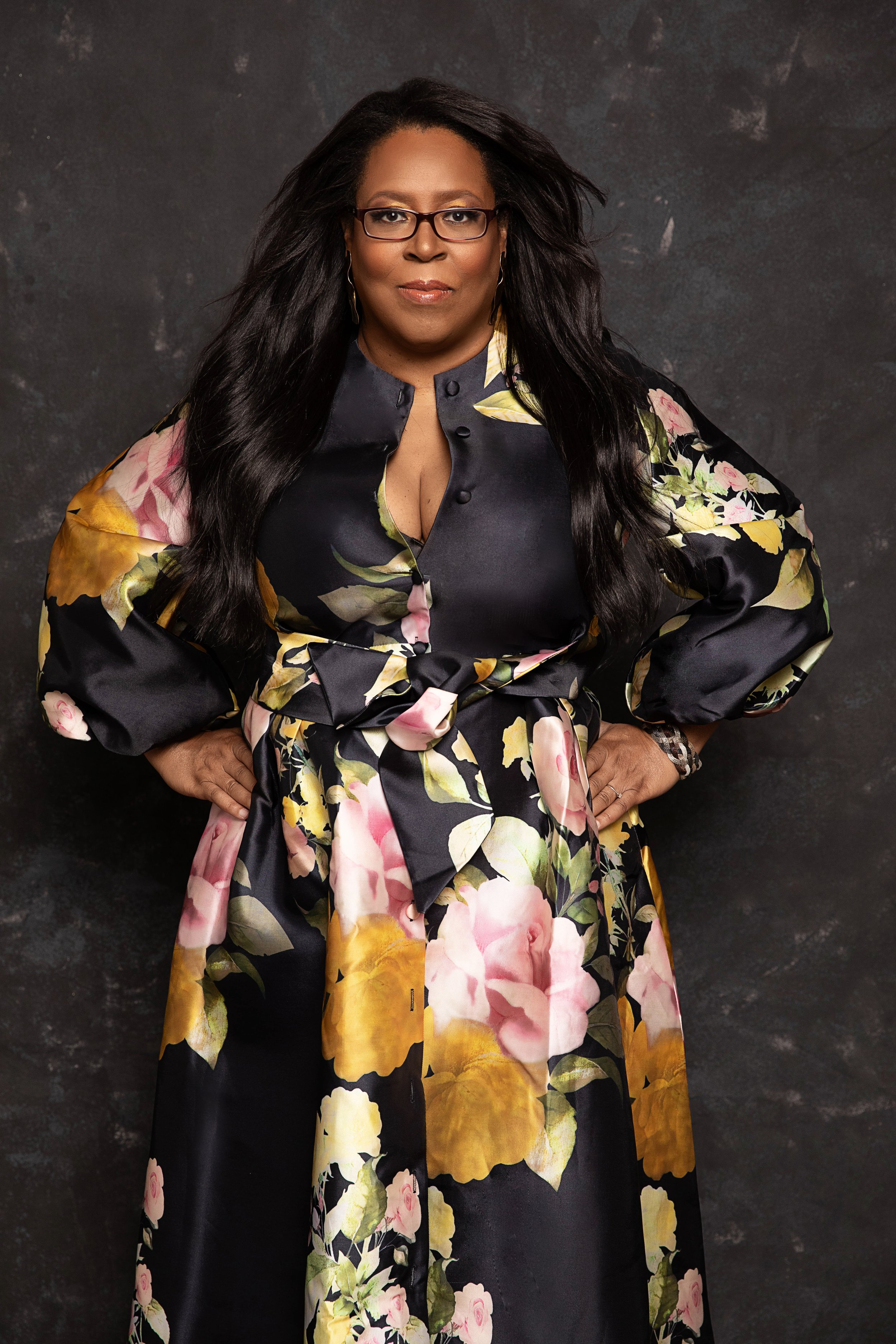Valerie coleman
COMPOSER / FLUTIST
“Coleman’s music has a special kind of joy. A sense of liberation and goodness that has been central to a certain American sound in classical music for decades.”
Valerie Coleman is an internationally acclaimed, Grammy® nominated composer and flutist. Highlighted as one of the “Top 35 Women Composers” by The Washington Post, she was Orchestra of St. Luke’s 2022 “Gift of Music” honoree and named Performance Today’s 2020 Classical Woman of the Year, an honor bestowed to an individual who has made a significant contribution to classical music as a performer, composer or educator. One of the most performed living composers in the world, her works have garnered awards such as the MAPFund, ASCAP Honors Award, Chamber Music America’s Classical Commissioning Program, Herb Alpert Ragdale Residency Award, and nominations from The American Academy of Arts and Letters and United States Artists. Umoja was chosen by Chamber Music America as one of the “Top 101 Great American Ensemble Works” and is now a staple of woodwind literature.
May 2024 features the world premiere of Coleman’s latest work, Concerto for Orchestra (Renaissance), with the Philadelphia Orchestra and Yannick Nézet-Séguin. Regional premieres of her Concerto for Orchestra take place in the 2024/25 and 2025/26 seasons with the Louisville Orchestra and Teddy Abrams, Atlanta Symphony Orchestra and New World Symphony. These follow a series of successful premieres of Coleman’s works with the Philadelphia Orchestra and Nézet-Séguin including the world premiere of This is not a Small Voice with soprano Angel Blue, Seven O’Clock Shout, and the orchestral arrangement of Umoja: Anthem of Unity.
Past season highlights for Coleman’s works include performances of Seven O’Clock Shout at the BBC Proms with Chineke! Orchestra, Umoja with Ballet X featuring choreography by Tiler Peck as well as a PBS broadcast with maestro Gerard Schwarz and the All-Star Orchestra, tours of Tracing Visions by Sphinx Virtuosi, and the World Premiere of Giants of Light by the Carnegie Hall National Youth Orchestra. Her chamber works have received premieres at Chamber Music Society of Lincoln Center, Chamber Music Northwest, Phoenix Chamber Music Society, Philadelphia Chamber Music Society, and Clarion Concerts.
In addition to multiple commissions at Carnegie Hall, Coleman’s works have been commissioned and performed around the United States including The Metropolitan Opera, New York Philharmonic, Los Angeles Philharmonic, Boston Symphony Orchestra, Chicago Symphony Orchestra, Detroit Symphony Orchestra, Atlanta Symphony, National Symphony Orchestra, Seattle Symphony, San Francisco Symphony, Baltimore Symphony, St. Louis Symphony, Minnesota Orchestra, Houston Symphony, Dallas Symphony, Orchestra of St. Luke’s, Orpheus Chamber Orchestra, Saint Paul Chamber Orchestra, The Library of Congress, American Composers Orchestra as well as the BBC Symphony Orchestra in the United Kingdom.
Former flutist of the Imani Winds, Coleman is the creator and founder of this acclaimed ensemble whose 24-year legacy is documented and featured in a dedicated exhibit at the Smithsonian National Museum of African American History and Culture in Washington, D.C. She recently co-founded and currently performs as flutist of the performer-composer trio Umama Womama.
As a performer, Coleman has appeared at Carnegie Hall and The Kennedy Center and with The Philadelphia Orchestra, Hartford Symphony, New Haven Symphony, Boston University Tanglewood Institute, Orpheus Chamber Orchestra, Banff, Spoleto USA and Bravo! Vail. As a guest flutist, she has participated in the Mid-Atlantic Flute Fair, New Jersey Flute Fair, South Carolina Flute Society Festival, Colorado Flute Fair, Mid-South Flute Fair and the National Women’s Music Festival. Coleman has appeared at a host of festival and collegiate multi-disciplinary residencies, including Orchestra of St. Luke’s, Chamber Music Northwest, Phoenix Chamber Music Society, University of Michigan and Coastal Carolina University. Coleman will be the featured guest artist at the Long Island Flute Club, Raleigh Area Flute Association, Greater Portland Flute Society, Seattle Flute Society, University of Wisconsin-Madison Flute Day, Bethune-Cookman University Flute Day and the Florida Flute Society Festival.
As a chamber musician, Coleman has performed throughout North America and Europe alongside Dover Quartet, Orion String Quartet, Miami String Quartet, Harlem String Quartet, Quarteto Latinoamericano, Yo-Yo Ma, Ani and Ida Kavafian, Anne-Marie McDermott, Wu Han, David Shifrin, Gil Kalish, members of the Los Angeles Chamber Orchestra, and jazz legends Paquito D’Rivera, Stefon Harris, Jason Moran and René Marie. A laureate of Concert Artists Guild, she is a former member of Chamber Music Society of Lincoln Center CMS Two.
Coleman’s work as a recording artist includes an extensive discography. Her works appear on Deutsche Grammophon, Sony Classical, Naxos, Cedille Records and eOne, including the 2023 Grammy® award winning album by New York Youth Symphony, and Imani Winds’ 2005 Grammy® nominated album, The Classical Underground. As a guest flutist, she has appeared on albums with Wayne Shorter Quartet, Steve Coleman and the Council of Balance, Chick Corea, Brubeck Brothers, Edward Simon, Bruce Adolphe, and Mohammed Fairouz. Her compositions and performances are regularly broadcast on American Public Media, NPR, Sirius-XM, WNYC, WQXR, Minnesota Public Radio, Radio France, Australian Broadcast Company and Radio New Zealand.
Committed to arts education, entrepreneurship and chamber music advocacy, Coleman created the Imani Winds Chamber Music Festival in 2011, a summer mentorship program in New York City welcoming young leaders from over 100 international institutions. She has held flute and chamber music masterclasses at institutions in 49 states and over five continents, including The Juilliard School, Curtis Institute, Manhattan School of Music, Mannes College of Music, New England Conservatory, Oberlin College, Eastman School of Music, Yale University, Carnegie Mellon, Interlochen Arts Academy, Beijing Conservatory, Brazil’s Campo do Jordão Festival and Australia’s Musica Viva. As a part of Imani Winds, she has been artist-in-residence at Mannes College of Music, Banff Chamber Music Intensive and Visiting Faculty at the University of Chicago.
In February 2024, Coleman was appointed to the Composition Department faculty at The Juilliard School. She is the Director of the Woodwind Quintet Workshop at Boston University Tanglewood Institute and holds faculty positions with the Manhattan School of Music, Mannes School of Music Flute and Composition Department and Norfolk Chamber Music Festival. Coleman previously served on the faculty at The Frost School of Music at the University of Miami as Assistant Professor of Performance, Chamber Music and Entrepreneurship.
She adjudicates for the National Flute Association’s High School Artist Competition, Concert Artist Guild, APAP’s Young Performing Concert Artists Program, ASCAP’s Morton Gould Award, MapFund Award and the Fischoff National Chamber Music Competition and has served on the Board of Advisors for Composers Now, Sphinx LEAD, APAP’s Classical Connections Committee and the National Flute Association’s New Music Advisory Committee and Board Nomination Committee.
Coleman’s compositions are published by Theodore Presser and her own company, Coleman Page. She studied composition with Martin Amlin and Randy Wolfe and flute with Julius Baker, Judith Mendenhall, Doriot Dwyer, Leone Buyse and Alan Weiss. She and her family are based in New York City.
For more information on Valerie Coleman:
Website
Facebook
Instagram
Contact:
Charlotte Lee
President & Founder
Primo Artists
212 804 8301
charlotte@primoartists.com
www.primoartists.com
”Coleman is an heir to the great mid-20th century American orchestral music.“
“Coleman’s music has a special kind of joy. It’s not ecstatic, but, rather, carefree – the same sense of liberation and goodness that has been central to a certain American sound in classical music for decades.”
The Philadelphia Inquirer
“These threads [of the Black experience] — and the emotions entwined with them — come through vividly in Coleman’s six-minute piece [Fanfare for Uncommon Times]. It begins not with a typical fanfare salute, but a quizzical, searching line for solo trombone that soon is cushioned by pungent, soft-spoken brass chords. Unrest amid determination stirs as the music shifts into agitated episodes for percussion. The mood seems at once reflective and restless, uplifting and ominous. The elements of the Black experience during a challenging time that Coleman described come through during a passage alive with riffs for mallet percussion instruments, hints of dance and bursts of anxious frenzy. By the end, with spurts of four-note brass motifs, echoes of Coplandesque affirmation arise, but also a breathless flurry that feels bracing yet challenging.”
“It was the feeling of hope and renewal, though, that prevailed, and it ran through the repertoire. Nothing could have come across as more spring-green than Valerie Coleman’s Seven O’Clock Shout’ What’s great about it is how it transcends its programmatic mission. The short piece has been performed before by the orchestra online with real impact. The music builds into something momentous, recalling the proud spirit of Copland’s Third Symphony.”
“Red Clay and Mississippi Delta, by Valerie Coleman, was terrific. A family portrait in sound, all the warts and quirks of querulous aunts, sleepy, slow-walking uncles and playful kids were vivid in this short stunner, and the performance captured the essence of each character. In the two klezmer dances, the clarinet wailed as though the sound were being extruded from some rusty pipe and then took off in cantillation-like spirals of ecstasy.”
“Coleman’s Phenomenal Women is a six-part concerto grosso for wind quintet. The juxtaposition of instrumental solos, chamber ensemble and orchestral textures created moments of memorable freshness and color. Five movements are dedicated to women who inspired Ms. Coleman — Maya Angelou, NASA mathematician Katherine Johnson, tennis star Serena Williams, Michelle Obama and Olympic boxer Claressa Shields. This allowed Ms. Coleman to show off her gifts for tone painting. She brilliantly captured the thwack-thwack of a tennis ball bounced in preparation for a serve. Staccato oboe notes tapped out a stream of digits in the movement dedicated to Johnson, while excited ascending figures traced the eventual liftoff of a spacecraft. The five Imani players performed the music with charisma and verve. Tucked between these portraits was a poignant movement dedicated to the mothers walking in the caravan of migrants headed for the American border. A solo flute wove echoes of Brahms’s classic Lullaby into a series of increasingly agitated flourishes. The music spoke of both tenderness and terror.”

